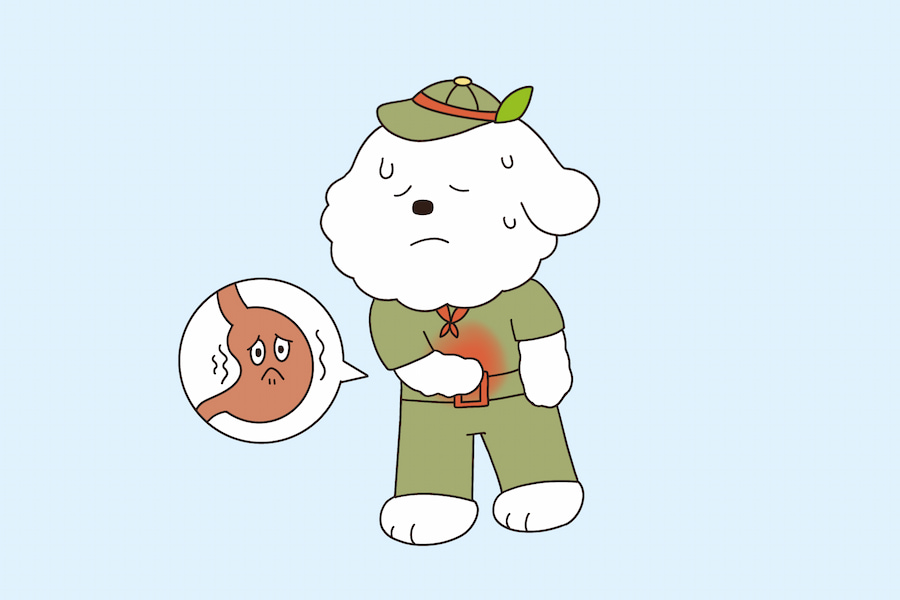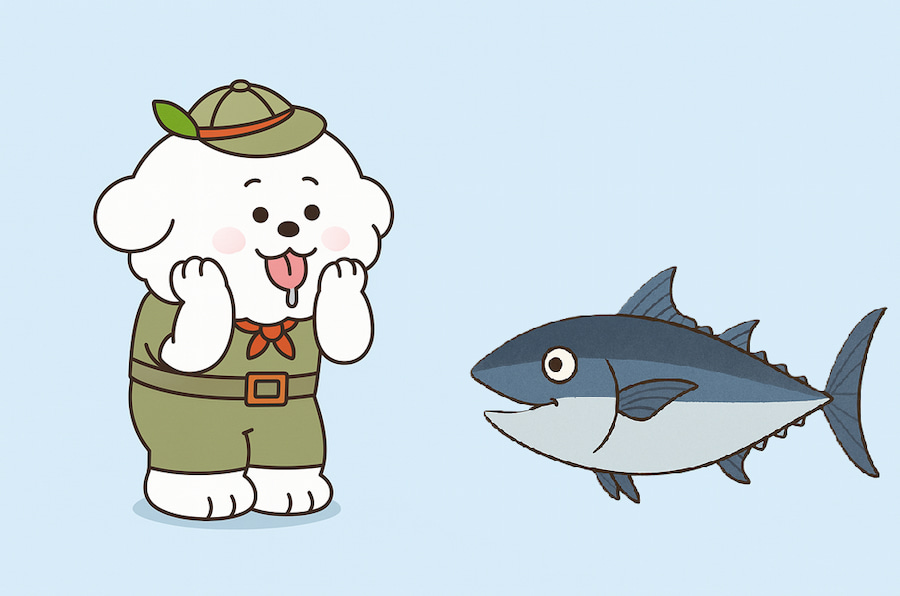Several fruits can be an ideal and delicious enhancement to your dog’s food. Not every fruit stands on equal ground with regard to nutritional properties. To keep your pet content and in good shape requires identifying good fruits for dogs and implementing them in their meals safely.
Dogs benefit from fruits that boost their immune systems and promote healthy skin and coat along with digestive function. Though many fruits are suitable for dogs, some should be avoided because of their toxicity. For instance, some fruits with pits—such as peaches—may cause stomach problems or choking dangers; grapes or raisins can also be dangerous.

We are dedicated to developing healthy treats for dogs by combining fruit that is safe and beneficial for their health with dried pollock, thoroughly removing salt over 24 hours!
What Fruits Can Dogs Eat?
While fruits improve dogs’ health, it is crucial to understand how each one impacts them and whether to incorporate it into their meals.
Blueberry
Your dog’s immune system gains benefits from blueberries‘ abundant antioxidants that help in reducing inflammation. The high fiber content in these fruits enhances health of the digestive system. As a food for managing weight in obese dogs, dogs enjoy the low-calorie nature of blueberries. However, too much intake could result in stomach discomfort.
Mango
Rich in vitamins A, B6, C, and E, mangoes make your dog’s immune system strong, improve the vision, and encourage healthy skin and fur. Although mango flesh is healthy for dogs, always remove the pit since it contains cyanide, which can be fatal and might cause choking problems.
Banana
High in potassium, bananas support dog heart health and muscular performance. They are also a fantastic choice for encouraging digestion because they have vitamin B6, vitamin C, and fiber. But bananas have a lot of sugar, thus you should feed them very carefully to prevent aggravating blood sugar problems or obesity.
Strawberry
Excellent for your dog’s general health, strawberries abound in vitamin C and fiber. They also include an enzyme meant to naturally assist your dog’s teeth get whiter. But strawberries should only be given in moderation, particularly to dogs prone to diabetes or weight increase, considering their sugar load.
Ripe Persimmon
Giving dogs ripe persimmons is safe and indicates a beneficial source of vitamins A and C. Your dog’s immune system gains strength from these vitamins and these also improve vision. Before you provide food, you should take out the seeds and pit as they might result in digestive troubles and bowel blockages. Stay with completely ripe persimmons; underripe ones could disturb your dog’s tummy.
Cherry
Thanks to their flesh, cherries provide your dog with little doses of vitamins A and C, which are good for its health. Extreme caution is advised, though, since cherry pits, stems, and leaves include cyanide, which dogs find poisonous. Unless you’re sure you’ve removed the pit completely, ingesting the pit can also lead to intestinal blockages, so it’s better to avoid offering cherries.
Peaches
Rich in vitamins A and C, peaches are excellent for a dog’s immune system and skin condition. Like cherries, the pit has cyanide and should be removed. One can get toxicity even from a tiny consumption of the pit. Furthermore, you should also avoid canned peaches because of their high sugar level and preservatives.
Apple
One great source of vitamins A and C, as well as fiber, is an apple. Apples’ crunchiness might also help clean your dog’s teeth. But apple seeds contain cyanide; hence, before eating, make sure to discard any seeds. Dogs on a weight control regimen will find apples perfect as a low-calorie treat.
Pineapple
Plenty of thiamin, vitamin C, and B6 exists in pineapples aiding a healthy immune system and effective digestion. The blend contains bromelain that aids digestion of proteins in dogs. Although the flesh is safe, steer clear of the spiky skin and rough core since these can irritate the digestive tract.
Watermelon
Mostly water, watermelons are a low-calorie, hydrating treat for dogs—especially in hot weather. Additionally, they are bursting with vitamins A, B6, and C. Still, be sure to cut out the seeds and rind since they could cause intestinal blockages. Although watermelon is perfect for keeping your dog cool and hydrated, its natural sugar level should be limited.
Although these fruits help dogs in many ways, including strengthening their immune systems and enhancing digestion, moderation and correct preparation are still absolutely vital. Always remove pits, seeds, and skins that could endanger your dog’s health. Appropriately presented, these fruits can be a great and healthy component of your dog’s diet!

Lee&Pol carefully removes any harmful parts, making the homemade treats safe for your dog to enjoy. We also include nutrient-rich dried pollock, packed with calcium, protein, and omega-3!

Fruit-Based Dog Treats
As we have already discussed, fruits are a great and healthy addition to your dog’s diet; one of the finest ways to present them as treats is by dried or freeze-dried fruit treats. These treats eliminate extra moisture and maintain many of the nutrients present in fresh fruits, so they are very handy. Let’s examine more closely the reasons why your dog would find great benefit from dried and freeze-dried fruit treats.
Dried Fruit Treats
When gently dehydrating fruit at a low temperature, water is gently removed preserving most of the vitamins and minerals. For handy snacking options these dried dog treats bring a unique texture and good shelf life. For treats while jogging or engaging in open-air adventures, dried fruits offer a practical option since they are much cleaner than fresh fruit.
Still, these delicacies should be consumed in moderation to avoid weight gain. We should always keep in mind that excess of everything is bad including these dried fruit treats.
Freeze-Dried Fruit Treats
Dogs might also benefit much from freeze-dried fruits. This method swiftly freezes the fruit and then removes the liquid in a vacuum, therefore preserving even more nutrients than drying. The end result is a lightweight, crispy delight with taste and nutritional value like the original fruit. Easy to transport and store, they are bursting with vitamins, antioxidants, and enzymes supporting the health of your dog.
Freeze-Dried dog treats have one of the main advantages as they concentrate the nutrients without including sugar or synthetic preservatives, which is usually present in commercial dog treats.
Dogs that appreciate crunchy textures especially benefit from freeze-dried dog treats; if your dog likes a softer nibble, they can even be rehydrated with water. Freeze-dried sweets are a healthy substitute for manufactured treats since, like dried fruits, they have no artificial components.

Following our 7-Free principle, Lee&Pol provides freeze-dried treats made with only pure fruits, without any added sugar, artificial sweeteners, preservatives, or other additives, offering a safe and healthy treat for your dog!
What Fruits Can Dogs Not Eat?
Although many fruits are safe and nutritious for dogs, there are a few that should be especially avoided since they might be dangerous. While certain fruits have poisonous chemicals, others could cause digestive issues or choking trouble. These are some typical fruits that dogs should not eat, together with the reasons behind their avoidance from your dog.
Grapes and Raisins
Even in small quantities, dogs associate grapes and raisins with toxicity which may result in serious kidney failure. While the exact chemical responsible remains uncertain, the reason is clear that grapes and raisins must be completely omitted. In serious cases of poisoning from grapes or raisins, kidneys fail; mild symptoms are vomiting and drowsiness.

Contact your veterinarian as soon as you discover your dog mistakenly ingested grapes or raisins.
Cherries (Pits, Stems, and Leaves)
Although the flesh of cherry is safe, leaves contain cyanide, which is poisonous to dogs. Eating these cherry bits can cause cyanide poisoning, which would compromise the dog’s capacity to move oxygen through its circulatory system. Symptoms could range from dilated pupils to trouble breathing to possibly collapse. Cherries are also dangerous for dogs since cherry pits can choke them and cause intestinal obstructions.
Avocado
Dogs may find avocados dangerous, particularly in big quantities, because of a chemical called persin. Although the avocado’s flesh has less persin and cannot cause major problems in small quantities, the pit, skin, and leaves are far more harmful. Additionally, a major choking hazard is the pit. Dogs should avoid avocado completely since eating it may cause stomach problems, vomiting, and diarrhea.
Citrus Fruits (Lemons, Limes, Oranges)
You should steer clear of citrus fruits like limes and grapefruit. These fruits cause discomforting stomach upset and may lead to diarrhea or vomiting. Citrus fruit seeds and leaves can have harmful oils that trigger severe reactions including tremors and depression. It is better to keep citrus fruit out of your dog’s meals.
Unripe Persimmons
Ripe persimmons are harmless for dogs; however unripe versions might result in digestive problems such as stomachache and diarrhea. The fruit’s seeds and peel might also upset your dog’s digestive tract resulting in blockages. Offer your dog only ripe persimmons that have been free of seeds.
Pomegranate
While pomegranates yield antioxidants, they are harmful for dogs to eat. Consumption of the seeds could trigger stomach discomfort including vomiting and diarrhea and the fruit’s sharp acidity may distress a dog’s gut. When your dog eats pomegranate, it could cause digestive issues.

Can Dogs Be Allergic to Fruit?
Indeed, although it is not quite common, dogs can be allergic to several fruits. Some dogs may respond negatively to particular fruits because of their individual sensitivity, the same as with other food allergies. If you believe, your dog could be allergic to a specific fruit, you should keep a close eye on them when adding other fruits into their diet. If you’re hesitant or if problems develop, I always advise seeing a specialized veterinarian.
Conclusion
Mixing in fruits into your dog’s food can lead to improved nutrition with a mix of vitamins and beneficial fiber. You have many safe choices including blueberries and bananas along with apples and watermelon. You must slowly and carefully bring fruits into their diet for puppies or dogs with delicate stomachs. Stay away from harmful fruits including cherries and grapes because they might lead to serious health dangers. Knowing which fruits are suitable will help you to add them to your companion’s diet confidently and gift both health benefits and a tasty treat.
FAQ
Your dog’s daily food should consist of roughly 10% fruit. Although fruits are healthy, their natural sugars can cause weight gain or digestive problems if overindulged. As occasional pleasures, fruits are ideal since they balance a diet. See your veterinarian for a particular direction based on the size, age, and condition of your dog.
If dried fruits are devoid of added sugars and preservatives, dogs can find them harmless. To be cautious, though, some dried fruits—including raisins—are poisonous to dogs and should be avoided.
Yes, but with extra care. Puppies’ fragile digestive systems mean that fruits should be introduced gradually and in moderation. Before changing your puppy’s diet significantly, always be sure to speak with your veterinarian.



